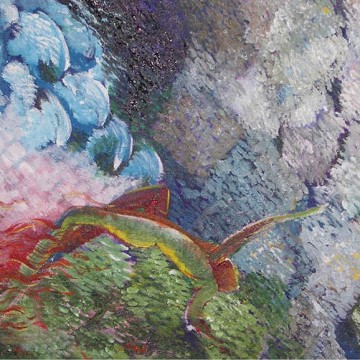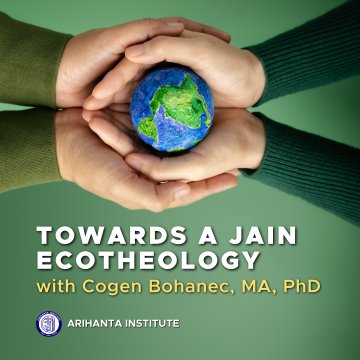Towards a Jain Ecotheology
Course Intro Video


Towards a Jain Ecotheology
Course 1010
For millennia, it has been widely recognized that the Jain tradition has been distinctive in its central focus on nonviolence (ahiṃsā) towards all beings (jīva-s). Because of this, Jain theology is uniquely oriented towards healing humanity’s strained relationship with the natural world. For several decades, the field of ecotheology had been developed by various thinkers from multiple world religious traditions, Christian in particular.
In this course, we will articulate a clear understanding of the methodology of ecotheology that can provide a framework where religious traditions might effectively advocate and empower ecological healing based on the unique paradigmatic resources of each tradition. This course will then examine what the Jain tradition might contribute to the bourgeoning academic discipline of ecotheology, and how the Jain tradition can play an important, necessary, and unique role in a pluralistic approach to environmental healing.
In this course, we will articulate a clear understanding of the methodology of ecotheology that can provide a framework where religious traditions might effectively advocate and empower ecological healing based on the unique paradigmatic resources of each tradition. This course will then examine what the Jain tradition might contribute to the bourgeoning academic discipline of ecotheology, and how the Jain tradition can play an important, necessary, and unique role in a pluralistic approach to environmental healing.
Course Length
4 HoursLearning Area
 Climate Change & Environment
Climate Change & Environment Instructor
 Cogen Bohanec, MA, PhD
Cogen Bohanec, MA, PhD
Cogen Bohanec currently holds the position of Assistant Professor in Sanskrit and Jain Studies at Arihanta Institute where he teaches various courses on Jain philosophy and its applications. In addition, he is an Adjunct Assistant Professor at Claremont School of Theology (CST) where he teaches Sanskrit and Gujarati, and he has taught numerous classes on South Asian Culture & Religions and Sanskrit language at the Graduate Theological Union (GTU) in Berkeley. Dr. Bohanec specializes in the Jain and Hindu traditions, comparative dharma traditions, philosophy of religion, theo-ethics (virtue ethics, and environmental and animal ethics in particular), and Sanskrit language and literature, and has numerous publications in those areas, particularly in the fields of Jain and Hindu Studies amongst other disciplines. He has a PhD in “Historical and Cultural Studies of Religion” with an emphasis in Hindu Studies from GTU, where his research emphasized ancient Indian languages, literature, and philosophical systems. He also holds an MA in Buddhist Studies from the Institute of Buddhist Studies at GTU where his research primarily involved translations of Pāli Buddhist scriptures in conversation with the philology of the Hindu Upaniṣads. He is the author of “Bhakti Ethics, Emotions and Love in Gauḍīya Vaiṣṇava Metaethics” (Lexington, 2024), an interdisciplinary study that frames traditional Hindu themes of ecotheology, ecofeminist theology, feminist care ethics, within a framework of virtue ethics in conversation with a bhakti-based psychology of emotions. Currently he is largely engaged in publication and research on various aspects of the Jain tradition, emphasizing translations and analyses of Jain Sanskrit, Prakrit, and Gujarati texts, but is also publishing academic works on various topics within the Hindu tradition.
Enrollment Options
14-DAY FREE TRIAL
- Free, unlimited access to our self-paced courses for 14-days.
- Already used your free trial? Enroll in our Monthly or Annual Membership options at anytime and continue learning immediately!
MONTHLY MEMBERSHIP
- $45 USD / Month
-
Immediate access to course
#### | Name. - Unlimited access to our live and self-paced courses for one month, with month-to-month auto rollover.
- Excludes graduate seminars, language courses, and courses hosted on partner platforms.

